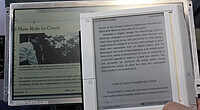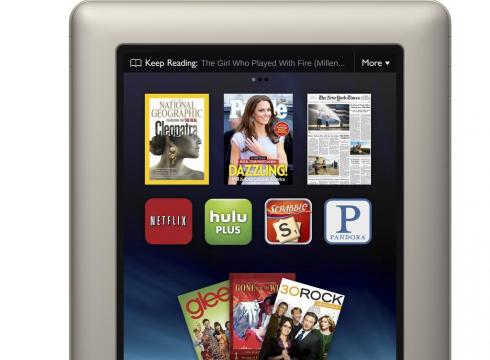In his recent news article, Good e-Reader Editor-in-Chief Michael Kozlowski expressed the opinion that Barnes & Nobles’ disappointing economic performance has been due, at least in part, to the company’s decision to stop the pirating of Android apps. Barnes & Noble did this by blocking the ability to install apps from “Unknown sources.” As a result, Nook Tablet owners could install only apps purchased from the Barnes & Noble dedicated app store. I believe, however, that the decision was driven by profit, not principle. Barnes & Noble chose to value short-term profit more than long-term customer satisfaction and any impact on app piracy was, at best, an unintended consequence.
I was an early purchaser of the Nook Tablet and heartily engaged in some of the forum discussions Michael mentions in his post. Based on what I read at the time, I would argue that the decision to block side loading was an attempt to supplement slim or negative device margins through the sale of apps in the company’s walled environment. There were several points that lead me to this conclusion.
Barnes & Noble has never, to my knowledge, stated that the decision to block side loading was an attempt to stop app piracy. Instead, the decision was explained as an attempt to increase device security and keep rogue apps from accessing customer account information stored on the device. Another indicator that the goal was to push app store purchases is that, in addition to blocking apps from unknown sources, Barnes & Noble made other OS changes that required users to buy apps not needed on other Android devices. For example, Barnes & Noble removed the Nook Tablet email app’s ability to access a Microsoft Exchange account. Why would they do that except to force customers to buy a pricey app to replace the function?
I believe that Barnes & Noble took a calculated risk by making decisions that it believed would directly impact only a small number of device owners. After all, most people would buy the Nook Tablet to read books and magazines and would not care about the ability to load apps not purchased in the company’s app store. By the way, these are not necessarily pirated apps, but apps that the owners already purchased from Google or Amazon and could have been reloaded without charge if the Google or Amazon app stores would run on the device. What Barnes & Noble seemingly failed to realize is that the small percentage of potential customers who did care about this issue could have a profound impact on those who didn’t. In a world of other choices, the quality of the Nook hardware could not overcome the negative impact of the company’s business decisions.
The forums, in addition to criticizing Barnes & Noble, also offered ways out of the problem. It would have helped build loyalty and sympathy by simply admitting that they needed their customers to buy from the walled store to help offset losses on the hardware. Other forum members suggested that the company sell a device-specific unlock code for a price that represented Barnes & Noble’s loss on the hardware or what they hoped to make on app sales. This is similar to Amazon’s later decision to sell cheaper ad-supported tablets. If customers don’t want ads supporting the cost of their device, they pay more. If Nook Tablet owners wanted to sideload apps, they could pay more. I would have happily paid for an unlock code and would have remained a Barnes & Noble customer.
There are, no doubt, a host of reasons for the continued decline of Barnes & Noble’s Nook business. I pin the losses on poor business decisions and I think one of those poor decisions was deciding to block sideloaded apps. That decision is, to me, just one example the company’s underlying business philosophy in dealing with customers and it is the company’s inability to satisfy its customers that will ultimately lead to its downfall. Barnes & Noble is not a casualty in the war against app piracy, its wounds are self-inflicted.

